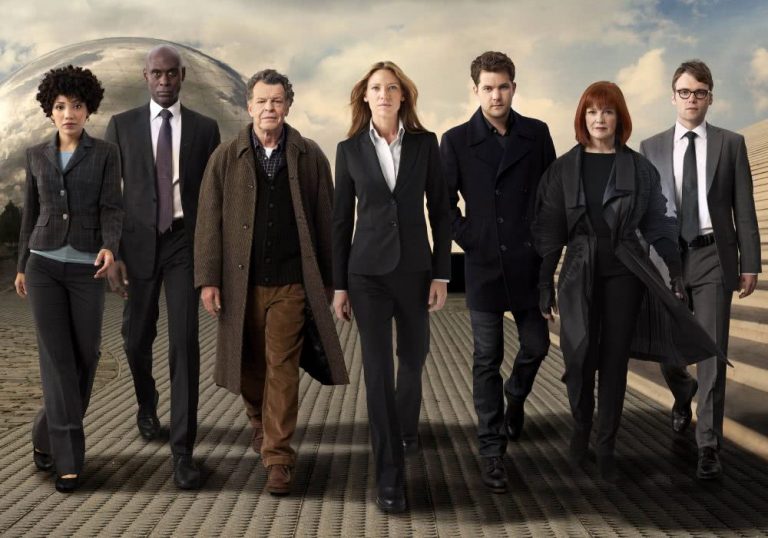There is something truly remarkable about finding a series that has the ability to both terrify and hook you within the first five minutes of the pilot episode. And there is something, perhaps innate in all of us, that seeks out the things beyond the human; something tempted to explore the very outer reaches of our moral systems.
Co-created by cinematic genius, lens flare enthusiast and master storyteller J.J. Abrams, Fringe took us to the edge of reality, consistently leaving more questions than answers. It tempted audiences with the paranormal, unproven and the wildly imaginative; the series holds a district aura of eeriness and an undeniable compulsion to believe in the impossible.
Combine the young and dedicated FBI agent Olivia Dunham (Australian actress Anna Torv), with a dysfunctional father-son duo, the erratic and brilliant scientist Walter Bishop and conman Peter (South Australian actor John Noble and Canadian Joshua Jackson respectively), and then add a dose of LSD, a lab full of bodies and you get the Fringe Division. Suddenly, the impossible seems more than probable.
It’s success and value also lies in its genuine connectedness and empathy with and for the human soul.
Strange occurrences are appearing all over the United States: a child is born and seconds later is found dead as an elderly man with the umbilical cord still attached, while Dunham discovers that a series of nocturnal murders are linked to a mysterious human experiment. And it’s through the solving of these cases – and Dunham’s acute mental resilience – that helps her learn that she possesses psychic abilities.
That’s merely a taste of the series’ shocking first season. Whereas the show does have a penchant for the grotesque (cue the opening scene of any given episode), the remedy is found in the palate-cleansing theme composed by Abrams himself, and the ensuing conspiracy, conundrum and catastrophe. The more you believe you’re beginning to understand the series’ arc and the mythology of the expansive Fringe universe, the more sensible reasoning becomes too illogical, too rational.
Slowly but surely, you learn the truth: there are multiples of everything – and not all of those copies are benign. There’s a war brewing: a war between this world and the one next-door, and the elements of known scientific method begin to collide with the less acclaimed notions of fringe science (or pseudoscience), effectively blurring the boundaries set by our own broken and reductive reasoning.
As the series progresses, the very fabric of reality is stretched to the point of tearing, until we can begin to see through to The Other Side. And those who live on the outer reaches of reality know about us; they see us for what we are. The Alternate Universe is home to its own peculiarities – creations like flying zeppelins and the still-standing twin towers – and its own threats. Those monsters who inhabit that foreign world will stop at nothing to ensure that it is their way of being that survives; that they emerge triumphant over the laws of science as we know them. Before long, it is the fate of these two worlds that rests in the hands of Dunham and Bishop.
While the Fringe team uncovers the threats of a mysterious Doomsday machine and inter-universe battles, Observers (enigmatic time-travellers with the ability to see the future) watch on, occasionally intervening in order to fulfil their purpose: maintaining balance in the timeline.
Fringe is phenomenal not only in its casting or in the wonderful execution of hypothetical science and often ludicrous ventures into the unknown: its success and value also lies in its genuine connectedness and empathy for the human soul. It does not refrain from tackling themes such as childhood abandonment, forgiveness and sacrifice, and doing so with a wide-eyed wonder lacking in so many television shows.
In its leanest, meanest form, the show reminds us of our own mortality; the broken systems of our own morality. That’s part of the reason why, ten years on, Fringe still lives on through its characters, its mythology and its steadfast belief that the boundaries of the possible really are only a matter of perspective.
Spanning five seasons, Fringe was a series that began as an ambitious and, more often than not, daring police procedural with compelling characters and a barrage of loose ends begging to be tied up. But as the seasons progressed and the characters started to mirror real, believable people, Fringe evolved to become an insight into the chasm of consequence, where the repercussions of our choices quickly become apparent.
Fringe celebrates the tenth anniversary of airing its first episode in September this year.


































